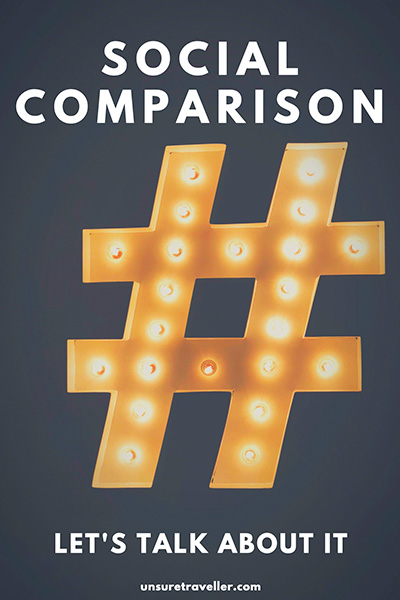Social comparison: let’s talk about it
Social comparison is one of the things I struggle the most dealing with. We all experience it at some point in our life, especially nowadays where we are all connected with each other.
It’s a double-edged sword as you can use it to improve yourself and reach higher goals, or it can be detrimental to you and your self-esteem. This last point is the type of relationship I have with social comparison. A constant presence of questions and doubts that make me go downhill rather than feeling confident.
Why does it happen?
There’s no person we spend the most time with than ourselves and this can lead us to, often, be our worst critic.
Comparison is the thief of joy.
Theodor Roosevelt
Social comparison happens very easily and it’s almost inevitable. Whether we want it or not, it’s a tendency innate in the human mind. We all desire things, either material or not, so it’s facile to feel discouraged or bad when others have something we want.
For sure, social comparison can also make you feel good about yourself. It can please you when you manage to achieve your goals. It can also motivate you to keep going and improving yourself and your outcome.
Because it is innate in us, we have to find a way to make it work for us and not against. Yes, it’s so easy to say it than to actually do it. Even I’m still trying to believe in it. But it’s important to work on building a better and more healthy relationship with it.
My social comparison
Reminder: this is my personal opinion about it and what I believe is the reason why my relationship with social comparison is so challenging.
It feels weird to be writing this post because it wasn’t planned at all. However, for the past week, a social comparison wouldn’t leave my mind. I was looking at people who had achieved so much and reached goals I dream about but don’t see myself achieving.
This constant upward social comparison ends up making me feel miserable and incapable of make certain dreams come true. The problem is that it’s a very easy type of social comparison to do because what I see is the end result of that person’s achievement and not the behind the scenes work needed to get there.
Comparing is something easy and, in a weird way, comfortable to do. You can do it in bed, while eating or watching tv and it takes little effort as it’s an automatic process. On the other side, getting started to achieve your goals and being consistent with it takes time, energy and willpower, hence it doesn’t feel as comfortable or easy.
Along with that, my not wanting to believe in myself is another major step to overcome. Again, it probably happens because it feels easier than the opposite. Not seeing myself capable of achieving that goal, automatically removes the need for my subconscious to do the hard work of actually starting the process of working towards something.
In believing that, I allow myself to spend my time doing something else which feels good at first, not energy demanding but not helpful in reaching my goals. Something I will, then, complain about and be harsh on myself.
It feels weird to be writing these sentences and to read them multiple times. In a way, they help me see things a bit more clearly. Then, a voice inside my head starts pushing me and making me feel empowered, ready and capable of change and achieving my goals. Opposite to this voice, though, there’s another one which makes everything feel too hard and pointless.
Just like having an angel and a devil on your shoulders.
Social comparison in the age of social media
We know that social media, most times, only shows the highlights of someone’s life. That’s what drags the most attention among society and that’s what increases social comparison.
I notice that in myself whenever I scroll on social media. Just like what I wrote in My experience with Instagram and anxiety, a FOMO experience would start because of this comparison between my life and their life. Consequently, this creates a chain of negative thoughts and beliefs because, you guessed it, it’s easier than taking actions.
How to work with it
Trying to build a better approach with social comparison can feel challenging. It’s still a big work in progress for me and, as you read above, my relationship with it’s still up and down. The tips I’m going to share below are the ones I tried myself and found to be the most effective. In fact, whenever I stop using them I can feel myself falling more easily and deeply into the comparison process.
Practice Gratitude
Often, we take a lot of things for granted because they seem to be things that everyone has access to.
We all have things to be grateful for and it’s good practice to remind ourselves of them. They might seem nothing much to us, but they might be dreams to others. Try writing 3 things you are grateful for every day or following some guided meditation about gratitude.
If you don’t know where to find them, you can read my blog post Three meditation apps to ease up your mind.
Move away from what’s negative for you
For me, this one is not always facile to accomplish. My curiosity often takes me back to things I know won’t help me. However, taking a break or moving away from profiles, apps or people who trigger social comparison is very beneficial.
I once deleted the Facebook app for some time and it felt so good. I had more time to dedicate to myself and my brain stopped thinking about it very quickly.
Accept and love yourself
Self-love is extremely powerful and important. Nobody is perfect, and we are all unique in our own way. So embrace what makes you you and make the best out of it! One of my Instagram followers sent me a message with this quote:
Don’t compare your page 1 to their page 15 when they are writing a different book.
I had to read it several times because it was so real and a very important reminder. Everyone is currently living their journey and writing their book. We might end up writing a bigger book than them or a more meaningful one. What is certain though, is that it’s going to be our own and unique life book.
Embrace faliure
Failing can be scary and it’s something we are often taught to avoid or to hide. However, failure is essential to grow and improve in yourself and your goals. You improve and gain experience by making mistakes and acknowledging those mistakes.
People who you think are more successful than you at something, have probably made more mistakes than you and learnt from them. Also, because new media mostly shows successful people living amazing lives, we are more prone to think that we are always failing and they are not.
It’s not an easy concept to understand and put into practice. I still find it challenging to not see myself or some of my actions as a failure and learn from them instead of complaining. But, just like Murphy’s law that says Anything that can go wrong will go wrong, next time something goes wrong, try to embrace it and learn from it.
Final thoughts
At first, I wrote this post just to empty my mind from all the self-draining thoughts and comparison it was making. However, I decided to share it because there are many people out there who go through this process and it can often make you feel like it’s only happening to you.
If you have been through it, don’t feel bad about you or your journey. Life is a beautiful mix of wonderful and tough moments. Cherish them, learn from them and don’t let them stop you from moving forward.
Feel free to comment your thoughts about this topic and other ways to work with it!
Pin it for later!





